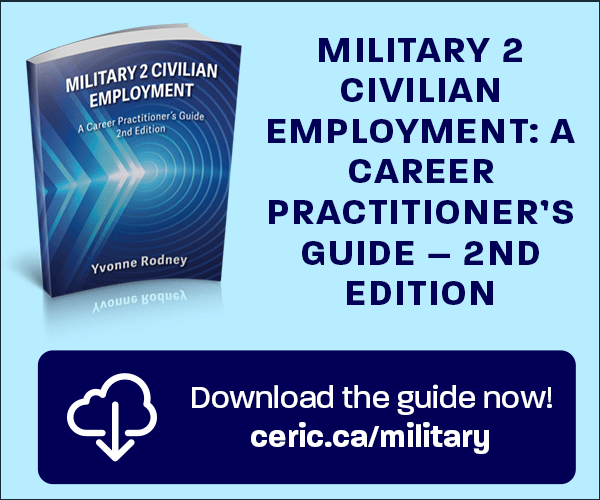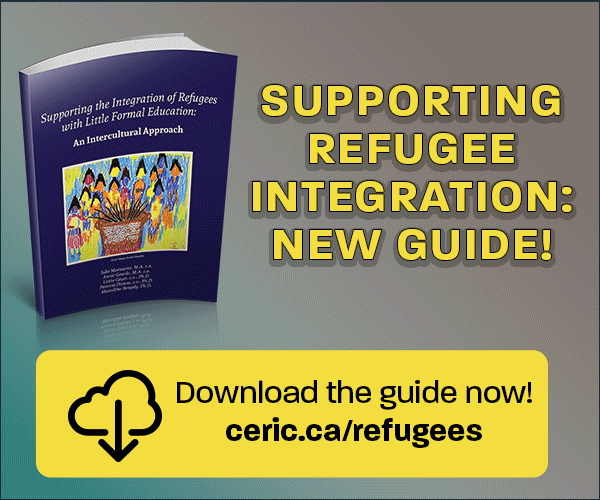Happy but Exhausted: The Role of Passion in Explaining the Mitigated Psychological State of Health and Social Services Nonprofit Workers
DOI:
https://doi.org/10.53379/cjcd.2024.397Keywords:
psychological health, wellbeing at work, burnout, nonprofit workers, job demands-resources model, passion for workAbstract
The goal of this study was to enhance our understanding of the psychological state of health and social services nonprofit workers using the concept of passion for work and the JD-R model. We proposed that both harmonious and obsessive passion influence the relationship between job resources and wellbeing at work, and that between job demands and burnout. To test this model, 774 workers completed an online survey. Results of path analysis indicate that job resources were positively associated with harmonious passion, while job demands negatively related to obsessive passion, although some cross-links appeared in both relationships. Results also showed that harmonious passion was positively related to wellbeing at work and negatively related to burnout, while obsessive passion was not related to burnout. Moreover, results showed that harmonious passion mediated the relationship between job demands and burnout, and that between job resources and wellbeing at work. However, obsessive passion was not a significant mediator of the job demands-burnout relationship. In addition, both types of passion were not significant moderators of the resources-wellbeing and demands-burnout relationships. Implications for research and practice regarding the psychological health and passion for work of nonprofit workers are discussed.
References
Ângelo, R. P., & Chambel, M. J. (2014). The role of proactive coping in the Job Demands–Resources Model: A cross-section study with firefighters. European Journal of Work and Organizational Psychology, 23(2), 203-216. https://doi.org/10.1080/1359432X.2012.728701
Baeriswyl, S., Krause, A., & Schwaninger, A. (2016). Emotional exhaustion and job satisfaction in airport security officers–work–family conflict as mediator in the job demands–resources model. Frontiers in Psychology, 7, 1-13. https://doi.org/10.3389/fpsyg.2016.00663
Bakker, A. B., & Demerouti, E. (2017). Job demands–resources theory: Taking stock and looking forward. Journal of Occupational Health Psychology, 22(3), 273. http://dx.doi.org/10.1037/ocp0000056
Bakker, A. B., & Demerouti, E. (2007). The job demands‐resources model: State of the art. Journal of Managerial Psychology. https://doi.org/10.1108/02683940710733115
Balducci, C., Schaufeli, W. B., & Fraccaroli, F. (2011). The job demands–resources model and counterproductive work behaviour: The role of job-related affect. European Journal of Work and Organizational Psychology, 20(4), 467-496. https://doi.org/10.1080/13594321003669061
Barbier, M., Hansez, I., Chmiel, N., & Demerouti, E. (2013). Performance expectations, personal resources, and job resources: How do they predict work engagement?. European Journal of Work and Organizational Psychology, 22(6), 750-762. https://doi.org/10.1080/1359432X.2012.704675
Benz, M. (2005). Not for the Profit, but for the Satisfaction? – Evidence on Worker Well-Being in Non-Profit Firms. Kyklos, 58(2), 155-176. https://doi.org/10.1111/j.0023-5962.2005.00283.x
Boudrias, J.-S., Desrumaux, P., Gaudreau, P., Nelson, K., Brunet, L., & Savoie, A. (2011). Modeling the experience of psychological health at work: The role of personal resources, social-organizational resources, and job demands. International Journal of Stress Management, 18(4), 372–395. https://doi.org/10.1037/a0025353
Carpentier, J., Mageau, G. A., & Vallerand, R. J. (2012). Ruminations and flow: Why do people with a more harmonious passion experience higher well-being? Journal of Happiness Studies, 13(3), 501–518. https://doi.org/10.1007/s10902-011-9276-4
Cavanaugh, M. A., Boswell, W. R., Roehling, M. V., & Boudreau, J. W. (2000). An empirical examination of self-reported work stress among US managers. Journal of Applied Psychology, 85(1), 65. https://doi.org/10.1037/0021-9010.85.1.65
Chen, C. A. (2012). Explaining the difference of work attitudes between public and nonprofit managers: The views of rule constraints and motivation styles. The American Review of Public Administration, 42(4), 437-460. https://doi.org/10.1177/0275074011402192
Chevalier, S. (2011). Les besoins non-comblés. Montréal: Direction de la santé publique, Agence de la santé et des services sociaux de Montréal.
Chevalier, S., Latulippe, D., & Nicolas, J. (2013). Les organismes communautaires des partenaires essentiel et dans le besoin portrait de leur contribution et de leur situation budgétaire. Montréal : Agence de la santé et des services sociaux de Montréal.
Couturier, E., & Fortin, M. (2021). Effets de la crise sanitaire sur le milieu communautaire : Portrait de la situation pour les organismes du Québec. Montréal : Institut de recherche et d’information socioéconomiques, 60 pages. https://iris-recherche.qc.ca/publications/effets-de-la-crise-sanitaire-sur-le-milieu-communautaire-portrait-de-la-situation-pour-les-organismes-du-quebec
Curran, T., Hill, A. P., Appleton, P. R., Vallerand, R. J., & Standage, M. (2015). The psychology of passion: A meta-analytical review of a decade of research on intrapersonal outcomes. Motivation and Emotion, 39(5), 631-655. https://doi.org/10.1007/s11031-015-9503-0
Dagenais-Desmarais, V., & Savoie, A. (2012). What is psychological well-being, really? A grassroots approach from the organizational sciences. Journal of Happiness Studies, 13(4), 659-684. https://doi.org/10.1007/s10902-011-9285-3
De Clercq, D., & Belausteguigoitia, I. (2017). Overcoming the dark side of task conflict: Buffering roles of transformational leadership, tenacity, and passion for work. European Management Journal, 35(1), 78-90. https://doi.org/10.1016/j.emj.2016.06.008
Deci, E. L., & Ryan, R. M. (2000). The “what” and “why” of goal pursuits: Human needs and the self-determination of behavior. Psychological Inquiry, 11, 227–268. https://doi.org/10.1207/S15327965PLI1104_01
Deci, E. L., & Ryan, R. M. (1985). Intrinsic motivation and self-determination in human behavior. New York: Plenum.
Demerouti, E., Bakker, A. B., Nachreiner, F., & Schaufeli, W. B. (2001). The job demands-resources model of burnout. Journal of Applied Psychology, 86(3), 499. https://doi.org/10.1037/0021-9010.86.3.499
Didier, S., Aubry, F., & Gervais, L. (2005). Pour que travailler dans le communautaire ne rime plus avec misère. Enquête sur les avantages sociaux dans les organismes communautaires. Montréal: Centre de formation populaire et Relais Femmes.
Donahue, E. G., Forest, J., Vallerand, R. J., Lemyre, P.‐N., Crevier‐Braud, L., & Bergeron, É. (2012). Passion for work and emotional exhaustion: The mediating role of rumination and recovery. Applied Psychology: Health and Well-Being, 4(3), 341–368. https://doi.org/10.1111/j.1758-0854.2012.01078.x
Fernet, C., Lavigne, G. L., Vallerand, R. J., & Austin, S. (2014). Fired up with passion: Investigating how job autonomy and passion predict burnout at career start in teachers. Work & Stress, 28(3), 270-288. https://doi.org/10.1080/02678373.2014.935524
Fernet, C., Austin, S., Trépanier, S. G., & Dussault, M. (2013). How do job characteristics contribute to burnout? Exploring the distinct mediating roles of perceived autonomy, competence, and relatedness. European Journal of Work and Organizational Psychology, 22(2), 123-137. https://doi.org/10.1080/1359432X.2011.632161
Fernet, C., Austin, S., & Vallerand, R. J. (2012). The effects of work motivation on employee exhaustion and commitment: An extension of the JD-R model. Work & Stress, 26(3), 213-229. https://doi.org/10.1080/02678373.2012.713202
Figley, C. R. (1995). Compassion fatigue: Coping with secondary traumatic stress disorder in those who treat the traumatized. New York : Routledge.
Forest, J., Mageau, G. A., Crevier-Braud, L., Bergeron, É., Dubreuil, P., & Lavigne, G. L. (2012). Harmonious passion as an explanation of the relation between signature strengths’ use and well-being at work: Test of an intervention program. Human Relations, 65(9), 1233-1252. https://doi.org/10.1177/0018726711433134
Forest, J., Mageau, G. A., Sarrazin, C., & Morin, E. M. (2011). “Work is my passion”: The different affective, behavioural, and cognitive consequences of harmonious and obsessive passion toward work. Canadian Journal of Administrative Sciences/Revue Canadienne des Sciences de l’Administration, 28(1), 27-40. https://doi.org/10.1002/cjas.170
Forest, J., Mageau, G. A., Crevier-Braud, L., Bergeron, É., Dubreuil, P., & Lavigne, G. L. (2012). Harmonious passion as an explanation of the relation between signature strengths’ use and well-being at work: Test of an intervention program. Human Relations, 65(9), 1233-1252. https://doi.org/ 10.1177/0018726711433134
Giroux, A., Meunier, S., Doucet, A., Lauzier-Jobin, F., Radziszewski, S., Coulombe, S., et Houle, J. (2022). Travailler dans le milieu communautaire : perspectives des travailleurs quant aux demandes et aux ressources qui influencent leur santé psychologique. Canadian Journal of Community Mental Health/Revue Canadienne de Santé Mentale Communautaire, 41(4), 20-35. https://doi.org/10.7870/cjcmh-2022-029
Govindji, R., & Linley, P. A. (2007). Strengths use, self-concordance and well-being: Implications for strengths coaching and coaching psychologists. International Coaching Psychology Review, 2(2), 143-153. https://doi.org/10.53841/bpsicpr.2010.5.1.6
Hardgrove, M.E. (2019). Determinants of Passion for Work. In R.J. Vallerand & N. Houlfort (Eds.). Passion for Work: Theory, Research, and Applications (pp. 171-200). New York: Oxford University Press.
Hsieh, J. Y. (2016). Spurious or true? An exploration of antecedents and simultaneity of job performance and job satisfaction across the sectors. Public Personnel Management, 45(1), 90-118. https://doi.org/10.1177/0091026015624714
Ho, V. T., Wong, S.‐S., & Lee, C. H. (2011). A tale of passion: Linking job passion and cognitive engagement to employee work performance. Journal of Management Studies, 48(1), 26–47. https://doi.org/10.1111/j.1467-6486.2009.00878.x
Houlfort, N., Philippe, F., Vallerand, R. J., & Ménard, J. (2014). On passion as heavy work investment and its consequences. Journal of Managerial Psychology, 29(1), 25– 45. https://doi.org/10.1108/JMP-06-2013-0155
Huang, J., Wang, Y., & You, X. (2016). The job demands-resources model and job burnout: The mediating role of personal resources. Current Psychology, 35(4), 562-569. https://doi.org/10.1007/s12144-015-9321-2
Janis, I. L. (1972). Victims of groupthink: A psychological study of foreign-policy decisions and fiascoes. Houghton Mifflin.
Jetté, C. (2008). Les organismes communautaires et la transformation de l’État- providence. Trois décennies de constructions des politiques publiques dans le domaine de la santé et des services sociaux. Québec: Presses de l’Université du Québec.
Kinnunen, U., Feldt, T., Siltaloppi, M., & Sonnentag, S. (2011). Job demands–resources model in the context of recovery: Testing recovery experiences as mediators. European Journal of Work and Organizational Psychology, 20(6), 805-832. https://doi.org/10.1080/1359432X.2010.524411
Lafrenière, M.-A. K., Vallerand, R. J., Donahue, E. G., & Lavigne, G. L. (2009). On the costs and benefits of gaming: The role of passion. CyberPsychology & Behavior, 12, 285–290. https://doi.org/10.1089/cpb.2008.0234
Laliberté, D. & Tremblay, I. (2007). Organisation du travail et santé mentale dans les organismes communautaires en santé et services sociaux de la Capitale-Nationale : regard sur une situation méconnue. Québec : Direction régionale de santé publique, Agence de la santé et des services sociaux de la Capitale-Nationale.
Landry, S. (2007). Travail, affection et pouvoir dans les groupes restreints: Le modèle des trois zones dynamiques. PUQ.
Lavigne, G. L., Forest, J., & Crevier-Braud, L. (2012). Passion at work and burn- out: A two-study test of the mediating role of flow experiences. European Journal of Work and Organizational Psychology, 21(4), 518–546. https://doi.org/10.1080/1359432X.2011.578390
Leys, C., Ley, C., Klein, O., Bernard, P., & Licata, L. (2013). Detecting outliers: Do not use standard deviation around the mean, use absolute deviation around the median. Journal of Experimental Social Psychology, 49(4), 764-766. https://doi.org/10.1016/j.jesp.2013.03.013
Lequeurre, J., Gillet, N., Ragot, C., & Fouquereau, E. (2013). Validation of a French questionnaire to measure job demands and resources. Revue internationale de psychologie sociale, 26(4), 93-124.
Liu, D., Chen, X. P., & Yao, X. (2011). From autonomy to creativity: a multilevel investigation of the mediating role of harmonious passion. Journal of Applied Psychology, 96(2), 294. https://doi.org/10.1037/a0021294
Lorente Prieto, L., Salanova Soria, M., Martínez Martínez, I., & Schaufeli, W. (2008). Extension of the job demands-resources model in the prediction of burnout and engagement among teachers over time. Psicothema, 20(3), 354–360.
Lüdecke, D., Ben-Shachar, M. S., Patil, I., Waggoner, P., & Makowski, D. (2021). performance: An R package for assessment, comparison and testing of statistical models. Journal of Open Source Software, 6(60). https://doi.org/10.21105/joss.03139
Lui, L. M., & McIntyre, R. S. (2022). Canadian healthcare system and individuals with severe mental disorders during coronavirus disease 2019: Challenges and unmet needs. Schizophrenia Bulletin Open, 3(1), 1-5. https://doi.org/10.1093/schizbullopen/sgac036
Mageau, G. A., Vallerand, R. J., Rousseau, F. L, Ratelle, C. F., & Provencher, P. J. (2005). Passion and gambling: Investigating the divergent affective and cognitive consequences of gambling. Journal of Applied Social Psychology, 35, 100–118. https://doi.org/10.1111/j.1559-1816.2005.tb02095.x
McElwain, A. K. (2009). An examination of the reliability and validity of the WorkFamily Guilt Scale. Guelph, CA: University of Guelph
Melnik E., Petrella F., & Richez-Battesti N. (2013). Does the professionalism of management practices in nonprofits and for-profits affect job satisfaction? The International Journal of Human Ressource Management, 24 (6), 1300-1321. https://doi.org/10.1080/09585192.2012.712543
Meunier, S., Giroux, A., Coulombe, S., Lauzier-Jobin F., Radziszewski, S., Houle, J., & Dagenais- Desmarais, V. (2021). Enquête sur la santé psychologique des travailleurs et des travailleuses du milieu communautaire au Québec lors de la pandémie de la COVID-19. Montréal: Université du Québec à Montréal, 62 pages. https://collections.banq.qc.ca/ark:/52327/bs4371945
Meunier, S., Giroux, A., Coulombe, S., Lauzier-Jobin F., Radziszewski, S., Houle, J., & Dagenais-Desmarais, V. (2020). Enquête sur la santé psychologique des travailleurs et des travailleuses du milieu communautaire au Québec. Montréal: Université du Québec à Montréal, 42 pages. http://collections.banq.qc.ca/ark:/52327/bs4151759
Mimeault, I., Cassan, C., & Cadotte-Dionne, M. (2011). Santé mentale au Québec: les organismes communautaires de femmes à la croisée des chemins. Montréal : Réseau québécois d’action pour la santé des femmes (RQASF).
Molino, M., Bakker, A. B., & Ghislieri, C. (2016). The role of workaholism in the job demands-resources model. Anxiety, Stress, & Coping, 29(4), 400-414. https://doi.org/10.1080/10615806.2015.1070833
Nelson, G., Janzen, R., Trainor, J. et Ochocka, J. (2008). Putting values into practice: Public policy and the future of mental health consumer-run organizations. American Journal of Community Psychology, 42(1-2), 192-201. https://doi.org/10.1007/s10464-008-9191-y
Nicolas, J. (2013). Portrait montréalais des besoins de la population et du milieu communautaire: On en parle ! Montréal : Réseau Alternatif et Communautaire des ORganismes ensanté mentale de l’île de Montréal (RACOR en santé mentale) et Collectif.
Nielsen, K., Yarker, J., Munir, F., & Bültmann, U. (2018). IGLOO: An integrated framework for sustainable return to work in workers with common mental disorders. Work & Stress, 32(4), 400-417. https://doi.org/10.1080/02678373.2018.1438536
Niemiec, R. M. (2019). Finding the golden mean: the overuse, underuse, and optimal use of character strengths. Counselling Psychology Quarterly, 32(3-4), 453-471. https://doi.org/10.1080/09515070.2019.1617674
Peng, K. Z., Wong, C.-S., & Che, H.-S. (2010). The missing link between emotional demands and exhaustion. Journal of Managerial Psychology, 25(7), 777–798. https://doi.org/10.1108/02683941011075300
Philippe, F. L., Vallerand, R. J., Houlfort, N., Lavigne, G. L., & Donahue, E. G. (2010). Passion for an activity and quality of interpersonal relationships: the mediating role of emotions. Journal of Personality and Social Psychology, 98(6), 917. https://doi.org/10.1037/a0018017
Philippe, F. L., Vallerand, R. J., & Lavigne, G. L. (2009a). Passion does make a difference in people’s lives: A look at well‐being in passionate and non‐passionate individuals. Applied Psychology: Health and Well‐Being, 1(1), 3-22. https://doi.org/10.1111/j.1758-0854.2008.01003.x
Philippe, F. L., Vallerand, R. J., Andrianarisoa, J., & Brunel, P. (2009b). Passion in referees: examining their affective and cognitive experiences in sport situations. Journal of Sport & Exercise Psychology, 31(1). https://doi.org/10.1123/jsep.31.1.77
Pollack, J. M., Ho, V. T., O’Boyle, E. H., & Kirkman, B. L. (2020). Passion at work: A meta‐analysis of individual work outcomes. Journal of Organizational Behavior, 41(4), 311-331. https://doi.org/10.1002/job.2434
Ratelle, C. F., Vallerand, R. J., Mageau, G. A., Rousseau, F. L., & Provencher, P. (2004). When passion leads to problematic outcomes: A look at gambling. Journal of Gambling Studies, 20, 105–119. https://doi.org/10.1023/B:JOGS.0000022304.96042.e6
Locas, M., Rivard, S., & Laprade, B. (2014). Les conséquences du sous-financement des organismes communautaires montréalais. Regroupement intersectionnel des organismes communautaires de Montréal, 12 pages. https://riocm.org/wp-content/uploads/2014/11/rapport-riocm-sous-financement-nov2014.pdf
Rip, B., Vallerand, R. J., & Lafrenière, M.-A. K. (2012). Passion for a cause, passion for a creed: On ideological passion, identity threat, and extremism. Journal of Personality, 80(3), 573–602. https://doi.org/10.1111/j.1467-6494.2011.00743.x
Rousseau, F. L., & Vallerand, R. J. (2003). Le rôle de la passion dans le bien-être subjectif des aînés. Revue Québécoise de psychologie, 24(3), 197-211.
Ryan, R. M., & Deci, E. L. (2002). Self-determination theory and the facilitation of intrinsic motivation, social development, and wellbeing. American Psychologist, 55(1), 68–78. https://doi.org/10.1037/0003-066X.55.1.68
Sheldon, K. M. (2002). The Self-Concordance Model of healthy goal-striving: When personal goals correctly represent the person. In E. L. Deci & R. M. Ryan (Eds.), Handbook of self-determination research (pp. 65–86). Rochester, NY: The University of Rochester Press.
Shirom, A., & Melamed, S. (2006). A comparison of the construct validity of two burnout measures in two groups of professionals. International Journal of Stress Management, 13(2), 176-200. https://doi.org/10.1037/1072-5245.13.2.176
Simbula, S., Guglielmi, D., & Schaufeli, W. B. (2011). A three-wave study of job resources, self-efficacy, and work engagement among Italian schoolteachers. European Journal of Work and Organizational Psychology, 20(3), 285-304. https://doi.org/10.1080/13594320903513916
Statistics Canada. (2019). Health Fact Sheets: Mental health care needs, 2018. Statistics Canada. https://www150.statcan.gc.ca/n1/pub/82-625-x/2019001/article/00011-eng.htm
Steger, M. F., Dik, B. J., & Duffy, R. D. (2012). Measuring meaningful work: The work and meaning inventory (WAMI). Journal of Career Assessment, 20(3), 322-337. https://doi.org/10.1177/1069072711436160
Stenseng, F., & Phelps, J. (2013). Leisure and life satisfaction: The role of passion and life domain outcomes. World Leisure Journal, 55, 320–332. https://doi.org/10.1080/04419057.2013.836558
St‐Louis, A. C., Carbonneau, N., & Vallerand, R. J. (2016). Passion for a cause: How it affects health and subjective well‐being. Journal of Personality, 84(3), 263-276. https://doi.org/10.1111/jopy.12157
Thorgren, S., Wincent, J., & Sirén, C. (2013). The influence of passion and work-life-thoughts on work satisfaction. Human resource Development Quarterly, 24, 469–492. https://doi.org/10.1002/hrdq.21172
Tims, M., & Bakker, A. B. (2010). Job crafting: Towards a new model of individual job redesign. SA Journal of Industrial Psychology, 36(2), 1-9. https://doi.org/10.4102/sajip.v36i2.841
Toth, I., Heinänen, S., & Puumalainen, K. (2021). Passionate and engaged? Passion for inventing and work engagement in different knowledge work contexts. International Journal of Entrepreneurial Behavior & Research, 27(9), 1-25. https://doi.org/10.1108/IJEBR-09-2020-0632
Trépanier, S. G., Fernet, C., Austin, S., Forest, J., & Vallerand, R. J. (2014). Linking job demands and resources to burnout and work engagement: Does passion underlie these differential relationships?. Motivation and Emotion, 38(3), 353-366. https://doi.org/10.1007/s11031-013-9384-z
Vallerand, R. J. (2015). The psychology of passion: A dualistic model. New York, NY: Oxford University Press.
Vallerand, R. J., Paquet, Y., Philippe, F. L., & Charest, J. (2010). On the role of passion for work in burnout: A process model. Journal of Personality, 78(1), 289-312. https://doi.org/10.1111/j.1467-6494.2009.00616.x
Vallerand, R. J. (2008). On the psychology of passion: In search of what makes people’s lives most worth living. Canadian Psychology, 49, 1–13. https://doi.org/10.1037/0708-5591.49.1.1
Vallerand, R. J., Salvy, S. J., Mageau, G. A., Elliot, A. J., Denis, P., Grouzet, F. M. E., & Blanchard, C. M. (2007). On the role of passion in performance. Journal of Personality, 75(3), 505–534. https://doi.org/10.1111/j.1467-6494.2007.00447.x
Vallerand, R. J., Rousseau, F. L., Grouzet, F. M. E., Dumais, A., & Grenier, S. (2006). Passion in sport: A look at determinants and affective experiences. Journal of Sport & Exercise Psychology, 28(4), 454–478. https://doi.org/10.1123/jsep.28.4.454
Vallerand, R.J., Blanchard, C.M., Mageau, G.A., Koestner, R., Ratelle, C., Léonard, M., Gagné, M., & Marsolais, J. (2003). Les passions de l’âme: On obsessive and harmonious passion. Journal of Personality and Social Psychology, 85(4), 756-767. https://doi.org/10.1037/0022-3514.85.4.756
Vallerand, R. J. (1997). Toward a hierarchical model of intrinsic and extrinsic motivation. Advances in Experimental and Social Psychology, 29, 271–360. https://doi.org/10.1016/S0065-2601(08)60019-2
Van den Broeck, A., Vansteenkiste, M., De Witte, H., & Lens, W. (2008). Explaining the relationships between job characteristics, burnout, and engagement: The role of basic psychological need satisfaction. Work & Stress, 22(3), 277-294. https://doi.org/10.1080/02678370802393672
Van de Ven, B., Vlerick, P., & De Jonge, J. (2008). Disq 2.0. The DISC Questionnaire French version 2.0. Eindhoven: Eindhoven University of Technology.
Van Veldhoven, M., Meijman, T. F., Broersen, J. P. J., & Fortuin, R. J. (1997). Handleiding VBBA: Onderzoek naar de beleving van psychosociale arbeidsbelasting en werkstress met behulp van de vragenlijst beleving en beoordeling van de arbeid [Manual of the QEAW: Research on the evaluation of psychosocial work strain and job stress using the questionnaire on the experience and assessment of work]. Amsterdam: SKB.
Wrzesniewski, A., & Dutton, J. E. (2001). Crafting a job: Revisioning employees as active crafters of their work. Academy of Management Review, 26(2), 179-201. https://doi.org/10.5465/amr.2001.4378011
Xanthopoulou, D., Baker, A. B., Heuven, E., Demerouti, E., & Schaufeli, W. B. (2008). Working in the sky: A diary study on work engagement among flight attendants. Journal of Occupational Health Psychology, 13(4), 345-356. https://doi.org/10.1037/1076-8998.13.4.345
Xanthopoulou, D., Bakker, A. B., Demerouti, E., & Schaufeli, W. B. (2007). The role of personal resources in the job demands-resources model. International Journal of Stress Management, 14(2), 121-141. https://doi.org/10.1037/1072-5245.14.2.121
Yukhymenko-Lescroart, M. A., & Sharma, G. (2022). Passion for work and well-being of working adults. Journal of Career Development, 49(3), 505-518. http://dx.doi.org/10.1177/0894845320946398
Zigarmi, D., Houson, D., & Witt., D. (2009). Employee Passion: The New Rules of Engagement (Employee Work Passion – Volume 1). The Ken Blanchard Companies. https://panel.blanchard.com.tr/Uploads/files/Arastirma/employee-work-passion-volume-1-employee-passion%20(1).pdf

Published
How to Cite
Issue
Section
License
Copyright (c) 2024 Canadian Journal of Career Development

This work is licensed under a Creative Commons Attribution-NonCommercial-NoDerivatives 4.0 International License.
















